Don't wanna be here? Send us removal request.
Text

WANTED! A group of adventurous explorers to go in search for King Solomon's Mines! I have discovered a map of great antiquity showing the way!
Well. No, not really. 😊 I found this in a copy of Wyld's 1834 Scripture Atlas when I was following up on old surveying books. Classic examples of 18th century maps.
0 notes
Text

My sport/hobby as you might have guessed is HEMA, Historic European Martial Arts and this photo (Above) of a vintage fencing mask caught my eye recently on Steampunk social media, I saw it on Martial Arts in the Steampunk 'verse via Steampunk Tendencies where it had been shared without a source by a moderator, Otar Bezhanov. It intrigued me, not a little because 'top-of-head-protection' has been raised as an issue recently, so I took the time to delve further into it.
My first hit using Google Image Search was on Brian Kirk’s blog “An elegant weapon for a more civilized age” from October 23, 2018. He gives no source for it but uses it as an example of how sports fencing masks of the mid 19th century appeared to have more shock protection than modern fencing masks. "...we can see that there was quite a diverse set of fencing masks employed during the mid 1800's, but the thing that they seem to all share, is that they are all more reinforced than modern fencing masks. A few of these, seem to be designed around actual military helmets, just with mesh added, while a few take on the look more associated with traditional fencing masks, but with many more reinforcing bars to protect the part of the head that are traditionally targets, the brow and the temple/ear."

Delving further I found some masks that were very close to this on a Hungarian fencing blog, szablyavívás. The earliest from Mar 30, 2018 titled <Parise-fejvédek> translates to ‘Parise headgear… Some pictures from the catalogue of an exhibition in Turin in 2006: <Dal duello allo sport - "Il Tocco della Spada"> (From dueling to sport - “The Touch of the Sword”): two headgear, a sports sword and an older fencing dagger."
The second photo on this page looks VERY close to the one we are looking for and is labelled <Parise-féle fejvéd kardvíváshoz (2. sz. típus; XIX. sz. vége)> which translates to "Parise headgear for fencing (Type 2; late 19th century)". The Italian text on the graphic translates to "Italy - Late 19th cent. Saber mask “second mod. Parise” “Honeycomb” triple headboard made of iron wire with central element covered in leather, neck guard and earmuffs of the same material"
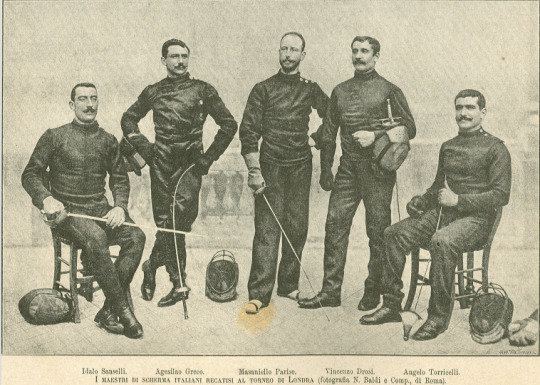
So what was Parise headgear? In the post previous to the one above on the Szablyavívás blog, it starts of by saying, "At the time when maestro Parise invented (~1884) his fencing headgear Hungarian sabreurs were using a rather different type of head protection."
This would appear to refer to the Italian Maestro Masaniello Parise who, in "1883 became the director of the Magistral School of Fencing, and his book became an official document that was used for the formation of new masters up until the 70’s." In the above photo he is in the centre – and a nice example of the mask we are talking about is by his right foot! Source: Carmimari.com.
2 notes
·
View notes
Text

For many, life is like an online role-playing game where a single mistake could be catastrophic. The major difference is that in real life, there's no respawning—it's a permanent game over! Don't think it couldn't happen to you? You could find yourself in an emergency situation at any time from war, family breakdown, or financial hardship. In the Red Queen's Race to earn enough just to survive, you might find yourself just three bad months away from living on the streets.
If this is the scenario you find yourself in, life is not an adventure, it's a jungle. A jungle where your goal is to stay alive and find a way out, a way home, a path to safety. In cases like this you don't need the advise of an adventurer, you need to listen to a survivor.
Colonel Freddie Spencer, DSO & Bar, ED was both! Before World War II he was an Arctic explorer and Himalayan mountaineer, a diplomat and a teacher. His exploits read like they were taken straight out of an adventure novel. As war approached he joined the Seaforth Highlanders and his talents in the Arctic were tapped for a number of still-born schemes until eventually he ended up in Singapore as the head of the Special Training School 101 for S.O.E., mere months before it's fall to the Japanese. For the next three years he survived behind enemy lines in Malaya and in 1948 he produced a seminal work on survival based on those years. Interestingly he talks about a mindset that can be applied to any "hostile" environment.
"My experience is that the length of life of the British private soldier accidentally left behind in the Malayan jungle was only a few months, while the average N.C.O., being more intelligent, might last a year or even longer. To them the jungle seemed predominantly hostile, being full of man-eating tigers, deadly fevers, venomous snakes and scorpions, natives with poisoned darts, and a host of half-imagined nameless terrors. They were unable to adapt themselves to a new way of life and a diet of rice and vegetables; in this green hell they expected to be dead within a few weeks - and as a rule they were. The other school of thought, that the jungle teems with wild animals, fowls, and fish which are simply there for the taking, and that luscious tropical fruits - paw-paw, yams, bread-fruit and all that, drop from the trees, is equally misleading. The truth is that the jungle is neutral. It provides any amount of fresh water, and unlimited cover for friend as well as foe - an armed neutrality, if you like, but neutrality nevertheless. It is the attitude of mind that determines whether you go under or survive. 'There is nothing either good or bad, but thinking makes it so.' The jungle itself is neutral."
When your world is a jungle remember, the jungle is neutral! View your environment as neither good nor bad, expect nothing and accept what comes, both good and bad. Beware the dangers but learn to survive on what is available, Spencer for example could not have survived without the support of the Communist Chinese guerillas.
“The things which we actually need are free for all, or else cheap; nature craves only bread and water. No one is poor according to this standard; when a man has limited his desires within these bounds, he can challenge the happiness of Jove himself.” Seneca quoting Epicurus
Your reality, your 'jungle', might be a harsh one, no one is trying to downplay your problem. The point here is to encourage you to fix the things you can fix and survive the things you can't. This agrees with Taoist metaphysics, where distinctions between good and bad, along with other black-and-white moral judgments, are perceptual rather than real.
There are some things that cannot be beaten and will never go away: lifelong, chronic or terminal illness, intergenerational poverty, old age... With these you can only play the long game, you can survive them as long as you keep putting one foot in front of the other on your escape route.
Freddie Spencer survived the jungle, the war, and had a productive and respected career as an educator. However in 1971 he took his own life due to chronic war injuries. If you or anyone you know has similar problems, help them survive!
1 note
·
View note
Text
Is Adventure Bad Planning?

Roald Amundsen is often remembered for the dour quote, "Adventure is just bad planning." While poor planning can undoubtedly lead to misadventure, this generalisation seems to denigrate the spirit of adventure. In reality, nothing could be further from the truth, as revealed when the quote is examined in its original context in his book, "My Life As An Explorer"...
I FIND that most people think of “adventure” when the word “exploration” is used. It may, therefore, be well to explain in detail the difference between the two words from the explorer's point of view. I do not mean to belittle the thirst for adventure. It is a perfectly natural longing for excitement that affects any man in normal health. Doubtless, it is an inheritance of our race from those remote ancestors whose struggle for existence involved the uncertainties of the chase, the hazards of combat with wild beasts, and the perils of the unknown. To them, life was a constant adventure, and the thrill that suffuses us in reproducing their experience is the normal thrill of healthy nerves reacting to the natural struggle for self-preservation. Our ancestors had to take the chances of death to get their daily livelihood. When we "flirt with death," we are going back to the compensating nervous pleasure of primitive man, which protected and elevated him in his daily struggle. To the explorer, however, adventure is merely an unwelcome interruption of his serious labours. He is looking, not for thrills, but for facts about the unknown. Often his search is a race with time against starvation. To him, an adventure is merely a bit of bad planning, brought to light by the test of trial. Or it is unfortunate exemplification of the fact that no man can grasp all the possibilities of the future. Every explorer has adventures. He gets a thrill out of them, and he takes pleasure in thinking back upon them. But he never goes about looking for them. Exploration is too serious a business. Not all would-be explorers realize this truth. The result is many a grave needlessly occupied before its time, and many a blasted hope.
While the popular misquote portrays Amundsen as a cold professional, he was, in fact, as impulsive and emotionally driven as any other adventurer. During the competitive ‘Heroic Age of Antarctic Exploration’, securing financial backing required expedition leaders to exude adventurous spirit with a proven capacity for success and reliability, a delicate balancing act which was challenging to maintain on the lecture circuit.
Exploration, by definition, involves venturing into the unknown, with risk as an inherent component. While the ability to confront danger with composure and leadership is essential, Amundsen prioritized meticulous planning. This he believed was the cornerstone of a successful expedition, minimizing risk from the outset and reducing the likelihood of misadventure. For a professional, unexpected challenges indicate a failure of preparation rather than an adventure...
...or "the fact that no man can grasp all the possibilities of the future."
4 notes
·
View notes
Text
The Riddle Of The Sphynx

Where you are on the spectrum of life is just another dynamic point in time moving from a past to a future. Your past is unchangeable but the future is a road before you with many forks in it. Some are uphill and treacherous and you are open to the misadventures of fate at any time from accident, disease or health.
However you have a massive choice in paths for you to take that are safer while still leading to fulfillment and satisfaction. Certainly the options open to me are thinning out, the more explosive and physical martial arts, the arts and crafts that will take decades to master. Multi-day, long distance hikes, grade six whitewater paddles, even hard grade canyons and climbs are out of the question There are many things that I only have limited resources in, strength, stamina, memory, agility, time…
But that’s the challenge, isn’t it? To do something that you feel is significant with the limited resources you have. By using those resources, whether they be physical, creative or interpersonal, you are exercising them and there is the very real probability that you will develop and increase them.
The Sphynx is behind be, the deadlines and stresses of my working life are in my past as is, sadly, my youth. There is so much more ahead of me though! The world is still full of wilderness to explore that is within my physical boundaries to reach. The principle behind microadventures is that you push to the edge of your limits without going beyond them into danger. This is the idea behind realistically challenging your fitness, that you push to the edge of your limits and in so doing extend them. Le Grand Baton, the venerable martial art of the staff, is what strikes my fancy at the moment.
In reality fitness and adventure are two sides of the same coin. You can’t accomplish your potential goals, experience the ‘flow’ of achievement, without the physical resources of fitness and stamina. By the same token fitness has to have a purpose beyond treadmill kilometres and kilo’s lifted, what that could be is open to your imagination. It could be sport, dance, play or just being out in the world smelling the flowers!
1 note
·
View note
Text

The Gentleman Adventurer turned 8 today!
EDIT: Tumblr has flipped! This blog is less than two years old!
0 notes
Text
Adventuring We Go!

Many, many years ago, in one of my previous lives, I was a prolific publisher of 'zines so, since I've generated a wall of text and graphics on my social media about this trek and adventuring in general, I thought… why not?
Thylacine 01 is the first issue of an occasional series of steampunk perzines of interest to Gentlemen Adventurers and other vagabonds! This month the focus will be on the first two days of the author's 60km trek for Movember but the overall quest will be to define the nature of adventure! Along the way, Victorian physical culture and Historic European Martial Arts will be explored alongside cutting edge research into diet, fitness and psychology to place the discussion into a modern context.
Thylacine 01 is available from here as a free pdf…
https://drive.google.com/file/d/1xLlCq6nFiQAMB5NBIBML97zbwaYVzn2d/view?usp=share_link
Help me strike a blow for men's physical & mental health by donating to my Movember Challenge HERE...
https://au.movember.com/mospace/7947857
7 notes
·
View notes
Text
Challenge Accepted!
I'm sorry for the lack of posts recently but I've been off doing adventuring …I still am actually! We started a six week fitness challenge at the end of October and, midway through week 2, I started a 60km walking challenge in aid of Movember! This walking challenge represents one kilometre for every man lost to suicide globally every hour. It is through Dharawal country within Wollondilly Shire and showcases the beautiful wilderness that is within minutes of our homes. It will be split into five 10-15km sections and to make it interesting I am making a concerted effort to stay off roads as much as possible, using fire trails only when necessary but sticking to established walking tracks, most of them the ones established by Robert Sloss in his local guide. You can donate towards Movember on my page at… https://au.movember.com/mospace/7947857
0 notes
Text
The Lonely Planet Guide to Experimental Travel
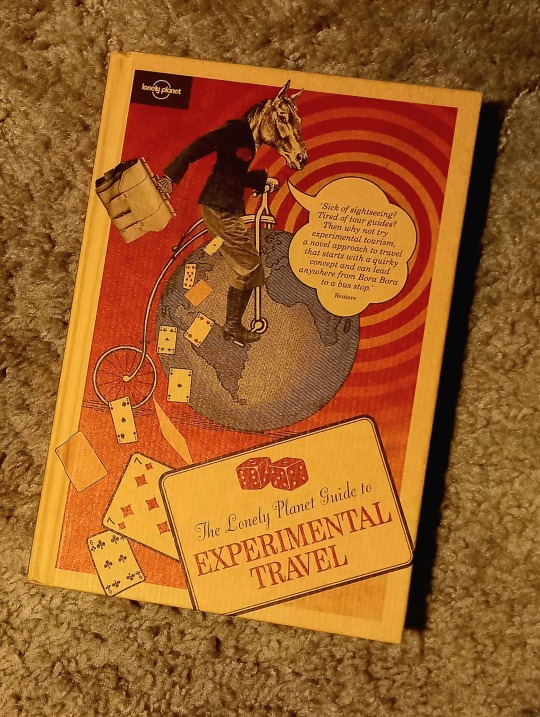
How can I describe the idea behind Experimental Travel? Imagine tourism as food.
The bare minimum for getting from point A to point B when you need to, is the same as a survival diet: No frills, it does the job and does not try to be aesthetically pleasant or stimulating. It's usually done at home, as efficiently as possible, and on a budget.
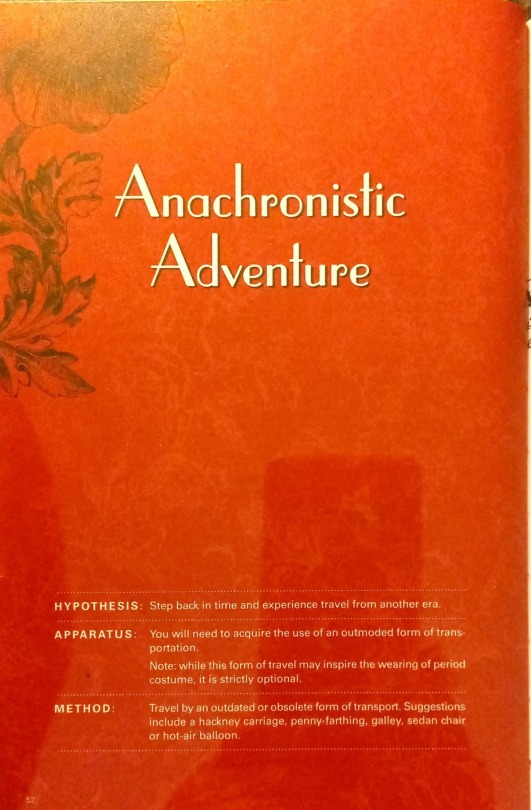
Commuting is like fast food or frozen meals, you need it every day so you want something that is tolerable but reasonably priced.
Tourism is when you start travelling for pleasure and equates to going out to a restaurant for a good meal. You are prepared to pay for good food, something different which often relies on the creative power of the chef. However you are still a consumer and the next person to order the same meal will get the same experience.
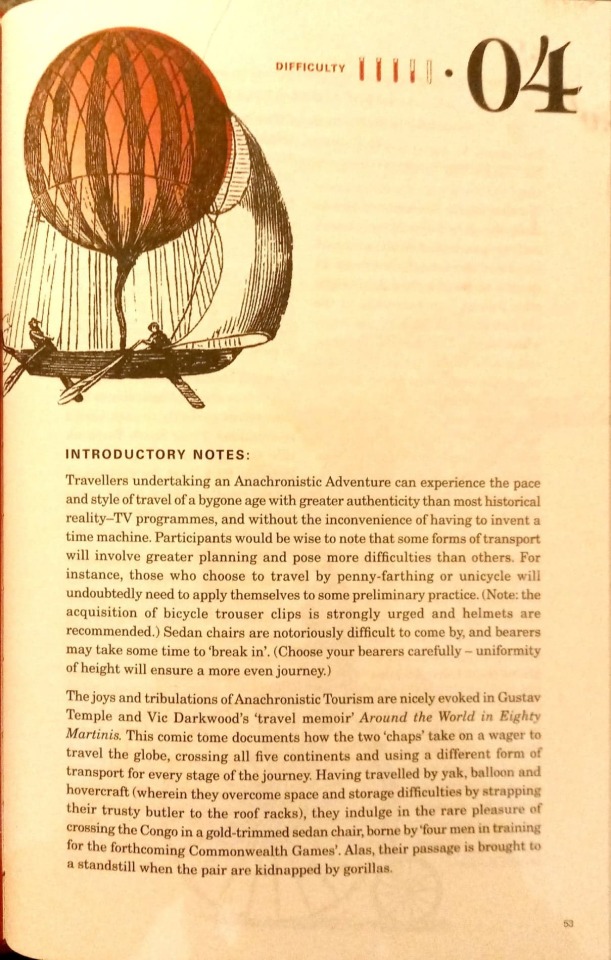
Experimental travel is adventurous travel! You find a challenge that is outside your normal experience, one that might have an element of managed risk. It is one that requires that you have to put some effort into it to achieve it, but if you do handle the challenge, even if you don’t succeed in every respect, you will appreciate it better than if you had done it in an easier or more efficient manner.
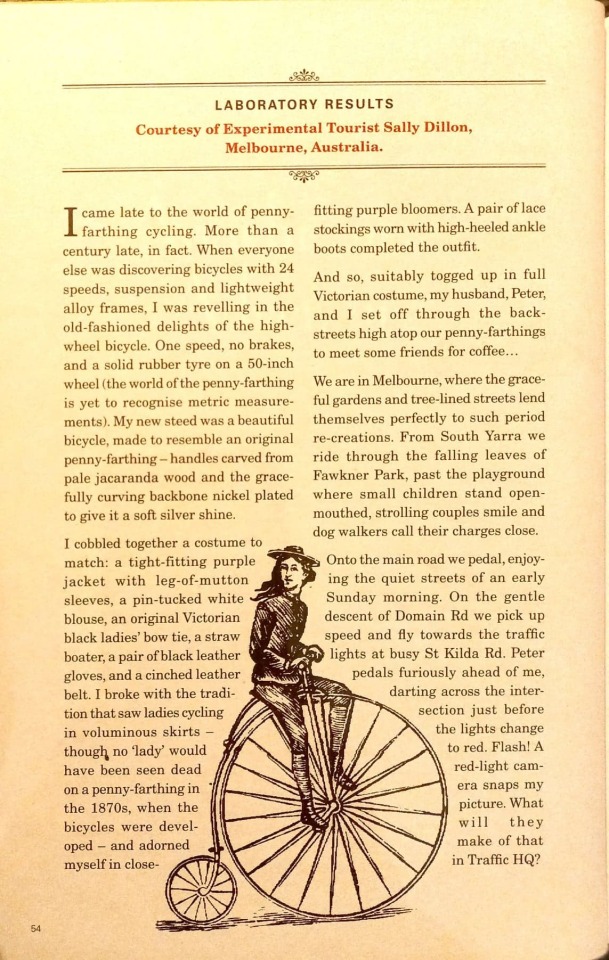
Try being mindful during the experience. Listen to the acoustics of the museum, take in the colours, shapes and textures. Appreciate the architecture, read the information boards, listen to the guide, search for the story behind the exhibits and their context with your world.
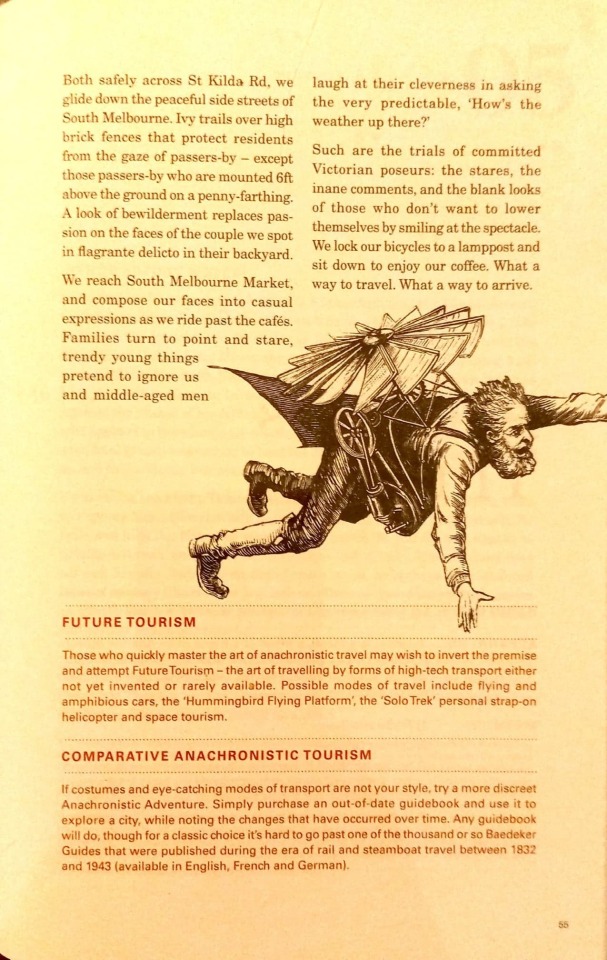
Even if the route that you choose to get from point A to point B turns out to be impossible, perhaps by a road blockage, it is not necessarily the wrong way. By being given a massive problem to resolve, you might find a detour that, quite literally, changes the course of your planned adventure.
0 notes
Text
Glory, risk and growth
A few weeks back I had the inestimable pleasure of crossing blades with my good friend Tim on the occasion of his birthday! This is a good segue into the work of Jon Levy whose book The 2 AM Principle: Discover the Science of Adventure was the subject of a popular article on The Science of the Perfect Night Out in GQ (and elsewhere) where he lists four elements of adventurous behaviour...
Constraints. “What we know from the brain is we get the most enjoyment from activities just outside of our skill zone. Like a video game that is fun because it is almost too hard.” This correlates with Csikszentmihalyi's flow model, as mentioned in my last blog.
Team. “A great group can make the most awful location fun.” Not sure about this. How do you explain those who adventure alone? I think this has more to do with his party manefesto although no successful adventurer is a rock unto themselves. They all have mentors, comrades and supporters.
Movement. “Your brain operates differently when you change location.” Hmmm, well this could line up with exploration as adventure and the idea of 'the quest'.
Mission. “This drives group behavior, causes outsiders to want to join, and helps you get out of your comfort zone.” Every endeavour of any worth has to have a purpose, however what about the pursuit of adventure for it's own sake?
At this point I have to point out that most reviews of his book pan it as shallow hedonism and the focus on the construction of 'a great night out' does deflect from considering his points in a larger context. I think he is on stronger ground when he is reported as saying that 'people seemed to have the most fun when three elements were present:
The experience was remarkable—worth talking about.
There was adversity or perceived risk.
It brought about growth—you were a different person at the end.
Glory, risk and growth, these have always been seminal aspects of adventure!
0 notes
Text
From Apathy To Arousal And Beyond

Back at the end of May I said, “I believe, and I think current research supports me, that the conundrum of what adventure is, and why it is such a driving force, is best found by looking into our own nature. Imagine if we could harness it and use it as a force for personal development?”
The conundrum of what adventure is and why it is such a driving force behind the glorication of dodgy hijinks, is best found by looking into our own nature. The series of articles in Wikipedia on adventure are, as is usually the case, accessible portals to a deeper study but I particularly like their generalisation that "adventurous experiences create psychological arousal [see Zuckerman], which can be interpreted as negative (e.g. fear) or positive (e.g. flow)."
Psychological arousal from fear? No, not that kind of arousal. Conquering fear is certainly an accomplishment but that's not what we're talking about here. What is meant here are managed levels of fear such as enjoying a roller coaster ride, sky diving or bungy jumping. This is the very reason we watch horror movies.
There are more than enough sources on Wikipedia to do a deep dive into the science behind this but, on a superficial level, I found the diagram that illustrated Csikszentmihalyi's flow model (above) to be intuitively enlightening.
If you are faced with a high level challenge but your skill level is low (top left of the diagram), you will feel anxiety or fear.
If you have a high skill level to face the challenge you feel the experience of flow (top right).
If you have a medium level of skill, you will feel arousal and that, I think, is the sweet spot!
This correlates with the fact that a challenging project for which you are ill prepared can be a risky adventure that can have you nervous, it’s not preferable but as long as that risk, that danger, is controlled, you will find it fulfilling as a challenge met and survived. Would it be fair to say that a challenge that you meet with a high degree of skill, eg. riding a bicycle in city traffic every day, could be overcome too easily and thus less fulfilling? Could this be why the median between the two leads us to 'arousal'.
0 notes
Text
Adventure as Stoicism
In popular culture adventurers are strong-willed heroes with 'stiff upper lips' who are admired for their ability to 'tough it out' when the going gets tough. What do 'adventurers' who carelessly put their lives at risk get out of the experience? Should it be seen as admirable? Can misfortune be a positive force in our lives? Stoicism is a school of philosophy that has some surprising answers to these questions.
If a man stirs himself to face the worst of disasters and defeats the evils which overwhelm others, then he wears those very sorrows like a sacred badge. For we are naturally disposed to admire more than anything else the man who shows fortitude in adversity. - Seneca
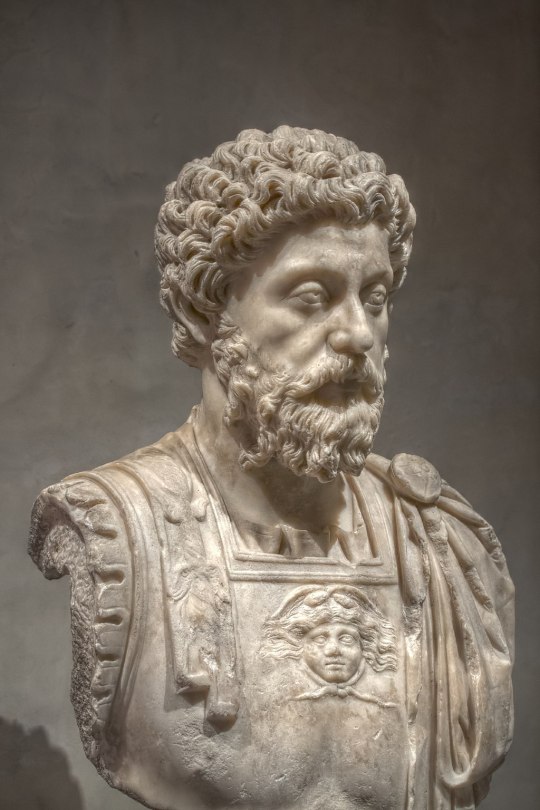
Stoicism comes from the third century BC Greco-Roman world yet it has survived through the ages with many famous people adhering to it's tenets. Like most philosophy it can be a steep learning curve but there are a lot of resources online which can give you an idea of it's major principles. Ranging from this neat summary through the more comprehensive Wikipedia article to whole websites such as The Daily Stoic which has a comprehensive library of articles, videos and podcasts you could easily get lost in.
It has a lot going for it, especially when it comes to battling the 'no-win' issues that we all face: facing mortality, downplaying things we have no control over, deemphasising consumerism, prioritising virtue and appreciating what people do rather than what they say.
But there are also a number of ways that I can see that it can be twisted to rationalise negative behaviour.
The idea of accepting things that we have no control over means that you don't beat yourself up over things that you could never change, however you must still plan to avoid misfortune as much as possible. You have no control over the weather but you can plan to avoid extreme weather and wear or carry wet weather gear. You might think that you have no control over the protection of the environment and as an individual you don't. However as a member of society you should do your part to contribute towards it's protection though. Leaving a trail better for your passage through it by doing one piece of trail maintenance doesn't solve the problem but it helps. A Stoic would point out that this is a virtue, one of the things that they see as the core of their world view.
Even worse though, it leaves the way open to accepting fate and condoning things that you can contribute towards fighting. As Henry Gruber writes in an article in Psyche, "if you accept your fate joyfully, as a Stoic sage should, you’ll never try to change it." It's a small step to go from, "No matter how hard I try I can't guarantee my safety" to, "Why should I bother with safety precautions if I can't guarantee my safety?" Again, this is an aberation of their way because correct action, fulfilling your duty as a leader or as part of a team by planning comprehensively, is a virtue. You do it because it's the right thing to do.
It is, above all, a philosophy of "the strong willed"...
Seneca “For the only safe harbor in this life’s tossing, troubled sea is to refuse to be bothered about what the future will bring and to stand ready and confident, squaring the breast to take without skulking or flinching whatever fortune hurls at us.”
Marcus Aurelius “Tranquility…comes when you stop caring what they say. Or think, or do. Only what you do.”
Epictetus “Circumstances don’t make the man, they only reveal him to himself.”
Certainly there are a lot of caring epigrams from Stoics, especially from the ex-slave Epictetus, because caring is a virtue, but this type of hard-nosed independance is what Stoicism is best known for. There are no half-measures here, it's the stoic ideal or failure. Modern society is built around inclusiveness and yet, in ancient stoicism at least, there is no attempt to allow for variables. Being self-contained and self-sufficient is all well and good if you are a high achiever but especially if we approach adventure as a way of developing and expanding as an individual, it doesn't encourage those who aren't.
Practitioners of modern Stoicism will point out that this is a shallow and skewed idea but it is an incredibly persistant one that needs to be addressed. Adventure is all about challenge, which carries the implication of success or failure and unplanned adventures such as survival situations, rescue attempts or war can often become critical situations where failure has dire consequences. Planned adventure theory steers away from this competative, binary, win-or-lose outlook and emphasises the achievement of at least making the attempt even if the goal is not reached.
Bottom line? Do your own research, I believe there's much of value in Stoicism but beware chiselled-chin, gung-ho types.

1 note
·
View note
Text
Interlude
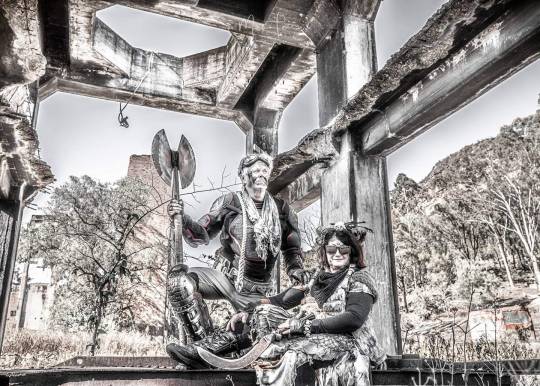
Before I delve deeper into details, perhaps I should explain my fascination with the concept of adventure. This isn't just some pedantic nit-picking at details, for me it defines the forces that are at work in my life right now.
My good lady wife and I are retired and like most 'Grey Nomads' as they call us, we are active retirees with a drive to live our lives to the fullest, fuelled by forty years of drudgery and the knowledge that our active life has a 'use by date' measured in decades at best. The term 'quality of life' for a senior isn't some abstract term, it's a very real measure that applies to our diminishing options for an active lifestyle. In other words, without getting too moribund...
The clock is ticking.
You can imagine then our frustration when, during the 2021 NSW pandemic lockdown, we were required to stay within our Local Government Area for months on end, at one point having to stay within 10kms of our home. Forget overseas travel, museums, concerts or being in any sort of public place for an unknown but certainly extended period of time.
The sound of the clock's ticking became louder.
We decided that, to get out of the house but stay within our LGA we would start hiking within our local area, and we were quite frankly stunned that we had lived within 10kms of some amazing wilderness areas for 30 years and not known about them! It was like exploring a hidden world with fascinating and beautiful discoveries being made every day!
Ok, so we weren't traversing the sweeping African veldt or hacking through the Amazon jungle but when we left the car behind and pulled out the twenty year old local walking guide by Robert Sloss - bless his little cotton socks! - we felt like we were following in the footsteps of explorers. I really felt like an adventurer and the irony of the fact that we were rarely more than 5kms from a major road, on the outskirts of one of the largest cities on Earth, was not lost on me.
It was a very positive experience and it got me thinking that this sense of adventure that we had accidentally chanced upon was what we had actually been hoping to achieve all along! As I studied the concept more, I realised it wasn't just me! Our friends seemed inordinately impressed with our 'adventures' when in fact it was just a novel, interesting passion with little degree of risk. The more I thought about our reaction and that of our friends, the more I realised it was a definate motivation in everyones life in one form or another.
It was the reason why people went on scary rides at the theme park, or went bungy jumping, sky diving or scuba diving with sharks! It was what people trapped by poverty, responsibility or boring jobs dreamed of. To be free to go on a hero's quest, to explore strange realms or to simply wander without aim through new vistas. It is why entertainment from books, radio, TV and movies through to interactive computer games, role playing games and cosplay has become more immersive over the years.
During my working life, a lot of my creative life was online, from writing and publishing fanzines to producing and acting in audio dramas. Later, as it became more popular in Australia, we started going to costuming events, making friends in real life as well as online. In all this, I was trying to expand my world, taking creative risks to write things and make things, to achieve things, to convince myself that I was more than just another working drone.
I wasn't alone, most people have a hobby or sport that they take up. In some cases it is an active participation, a skill or a craft: woodwork, vintage cars, model trains, slot cars. In other cases it is a passive obsession, collecting stamps, writing, raiding on World of Warcraft. You could say it is an escape but there has to be a challenge to it as well so that, in some small measure, there is an accomplishment to achieving your goals in it.
People who aren't adventurous are either those lucky ones who are content with their lives or the unlucky ones who don't have the opportunity. Sometimes there are identifiable reasons why they can't or won't do the interesting things that they see others doing. It usually comes down to money. As a kid in a struggling, working class home I used to drift off to sleep dreaming of sailing, skiing or scuba diving like Jonny Quest but knowing that 'people like us don't do things like that.' Knowing why you are excluded from a life of adventure isn't the same as accepting it though and I believe it is at least one of the reasons why depression and melancholy can escalate into psychological problems.
The more I thought about the concept of adventure, the more questions it raised. Does lack of opportunity have to mean adventures are impossible? Specifically, can someone who can't travel or has health or economic constraints, be adventurous? Must adventure require life-long commitment, physical prowess and/or a bottomless piggy bank? If we could pin down the mechanics of personal fulfillment, if we could bypass the roadblocks to adventure, it could change the quality of life of anyone with the right mindset.
There in a nutshell is my obsession with adventure seeking. I might not be on the right trail for the meaning of life but y'know what? It doesn't really matter! My journey, my experiences and enlightenment along the way, makes the journey worthwhile.
...and that, o' hypothetical reader, is my adventure!
Picture credit: Mick Tait at Glen Davis, NSW
0 notes
Text
Adventure as Sensation Seeking?

There is no 'scale' that we can attach to adventure but it is interesting to note that Psychologists have created a survey that, when scored and analysed, shows how much individuals crave new and novel sensations compared to others.
The Zuckerman Sensation-Seeking Scale, or SSS-V (because it is the fifth version of this survey), consists of 40 forced-choice questions that are designed to assess individual attitudes towards stimulation. It consists of four sets of ten questions, each set focuses on four different types of sensation-seeking.
Thrill and Adventure Seeking (TAS) which could range from amusement park rides, hiking and canoeing to parachute jumping, mountaineering or white-water rafting.
Experience Seeking (ES) such as new and stimulating music or dancing through exploring other cultures and lifestyles to immersion tanks and transcendental meditation.
Disinhibition (DIS) is the degree of social stimulation that a person seeks, ranging from the social inhibition of a recluse through the average person's social interaction to the opposite extreme of xxxx
Boredom Susceptibility (BS) e.g., preference for unpredictable friends).
It's important to note that this scale is used in clinical psychology and so talks a lot about deviations from 'normal', and gives some pretty extreme examples. Scales range from positive to negative extremes with a zero point in between, I think it is fairer to call this an average rather than normal. Taking out these judgemental connotations, a person's answers to these questions can not only highlight the inclinations they should follow but also any imbalances that need to be adressed.
As long as the person taking the survey does not go beyond ethical, moral or legal boundaries, a result other than normal shouldn't be taken as a personal issue.
If we find our lives imbalanced towards one extreme, perhaps we are too timid in our experience of music, pushing towards the other extreme either gradually or by going to a hyperstimuating concert could change our lives for the better.
The danger is in the constant drive for stimulation. I remember a fantastic family holiday as a kid when I asked my dad, "Why can't we move down here so that it will always be like this?" To which he gave me a bite of reality...
"It wouldn't be a holiday then, would it?"
0 notes
Text
Adventure is not outside man: it is within
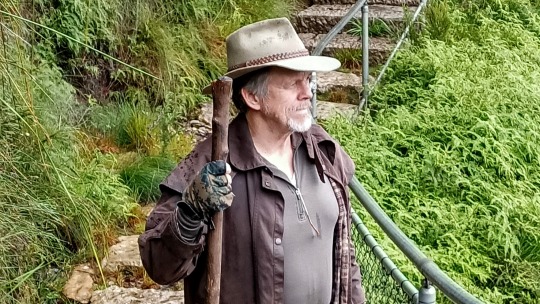
Life revolves around needs and wants. We need food but we want things that taste good. The basics of cooking and good cuisine are based on research into dietary needs and tastes plus the skill and art of chefs from whom there are thousands of cookbooks and courses. There are however, very few scientifically backed learning resources for you to elevate your life-goals from your need of personal survival to your want of personal fulfillment.
Sure, we have squillions of self-help books, but they are basically survival manuals for living. When it comes to making an art form of survival, instruction on why we need to seek challenges and how to gain personal satisfaction from them, the literature gets a bit thin.
"But what about..." all the books and other media that wax lyrical on examples of adventure? I recently came across a list of the 100 Greatest Adventure Books of All Time by National Geographic Adventure Magazine, yet they were all autobiographies, journals, memoirs. Snapshots of adventures, anecdotes from the adventurous but nothing that specifically explains or expands on why they are adventures.
I believe, and I think current research supports me, that the conundrum of what adventure is, and why it is such a driving force, is best found by looking into our own nature. Imagine if we could harness it and use it as a force for personal development?
0 notes
Text
Bespoke Adventuring
Why does the conversation always seem to turn to exploration when we are talking about adventure? Basically because exploration is adventurous travel and the public's ideal of adventure is synonymous with new and stimulating places! So much so that, if you plug "adventure" into Google, the travel industry seems to have a virtual monoply on it!

Their answer to the desire for adventure is simple: get your adrenalin rush by going somewhere new, doing something different! The tracks of bygone explorers are now tramped by amateurs. 'Adventure' has become a defining adjective, a driving force for socially and personally beneficial outcomes. From a commercial point of view, the quest for adventure is boosting tourism and other service industries but, given responsible access to destinations and traditional societies, this could be a good thing.
Adventure tourism - Tour companies who organise an adventure experience for you in some exotic locale, many with a certain amount of perceived risk.
Adventure sports - If people find something to do together, they will find a way to compete to see who does it better, faster or longer!
Adventure racing - Competition between expedition teams using varous modes of transport over an unmarked, hazardous course.
It's not all commercial enterprise though. Using adventure as a driving force really has been found to be beneficial in physical and psychological therapy.
Adventure therapy - The idea that exposure to adventure has positive psychological effects. Long-standing organisations and studies show the effectiveness of this.
Adventure education - The idea behind this is more holistic in that the goals are focussed more on the journey that the participants take to face their problem.
In theory I like all of these. Travel, especially to countries and cultures other than your own which takes you out of your comfort zone, can be rewarding and adventurous. I've always liked the idea that vacations and travel should have a purpose, that you need to actually have something that you want to do when you travel somewhere. With regards to the idea of adventure making changes to self image: absolutely! I would go so far as to say that this is the purpose of many 'rite of passage' traditions that cultures all over the world have in common.
My problem with them is the impression that adventure is something you can only buy, sell, rent or give to people. Like any item of value, there are those who can easily craft it from their talent, skill and experience built up over years, but with perseverence and study you can create your own! Whilst placing yourself into a new and interesting environment can be a factor in adventure, don't fall into the trap of thinking that excitement is unattainable without the cost of travel and equipment. You can have very real adventures by expanding the boundaries of knowledge and experience in your own backyard, quite literally!
How do you craft your own adventure? The same way you create anything, from a house or a car to a hat or a boot! You need to understand what it is, what you want, what the safety limitations are and listen to the experience of others who are experts.
0 notes
Text
Is there nowhere left to explore?
"These days there seems to be nowhere left to explore, at least on the land area of the Earth. Victims of their very success, the explorers now pretty much stay home."
This quote by Carl Sagan is famous - in some quarters, infamous! - although he was of course suggesting that space exploration is the next great frontier for humanity. He had a valid point. The outlines and details of the global map have been filled in by centuries of expeditions and, more recently by satellites but human curiosity is not just confined to the surface of the Earth. Exploration continues to expand our knowledge of the rivers, the seas and the bowels of the Earth!
How can there ever be an end to exploration when with every boundary crossed, every mystery solved, we identify new realms for exploration, new questions to answer? Mapping the Great Barrier Reef is not the same as understanding everything about it - the more you know, the more you realise you don't know.
Because that is what exploration is: the physical and intellectual search for experiences and knowledge, ranging from expanding the boundaries of science, right through to who or what is on the other side of that hill.
1 note
·
View note